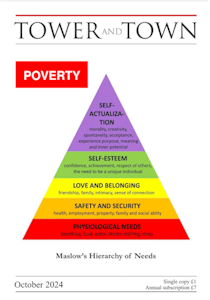

Tower and Town, October 2024 (view the full edition) (view the full edition)Marlborough's V.I.P'sThe elderly and vulnerable populations often face numerous challenges, particularly in relation to social isolation and financial hardship. Access to social centres like The Jubilee, and the ability to afford heating during colder months are two critical issues that deeply affect their well-being. Social Isolation and Community Centres For many elderly and vulnerable individuals, social centres provide vital support. These centres serve as hubs where they can engage in social activities, access services, and form connections with others. For those living alone, visiting a social centre can be a crucial lifeline, offering companionship and alleviating loneliness, which can otherwise lead to depression and anxiety. Social interaction is essential to maintaining mental health, especially in older age when opportunities for socializing may become more limited due to mobility issues or the loss of loved ones. Additionally, social centres often offer access to important services such as health screenings, meals, or exercise programmes designed to maintain physical well-being. However, access to these centres can be uneven. In rural or underfunded areas, there may be few such facilities available, and those that do exist may not be accessible for everyone due to transportation issues. As a result, many elderly and vulnerable people may become socially isolated, further exacerbating feelings of loneliness and neglect. The Financial Struggle to Heat Homes Financial struggles are another significant issue for many in the elderly and vulnerable populations, particularly when it comes to heating their homes during the winter months. With rising energy costs and fixed or limited incomes, many face the difficult decision of choosing between heating their homes or paying for other essentials like food and 'over-the-counter' medication. This is often referred to as "fuel poverty." Living in a cold home can have severe consequences for health. For older people, prolonged exposure to cold can lead to respiratory issues, hypothermia, or exacerbated chronic conditions such as arthritis. Vulnerable individuals with pre-existing health problems are at even greater risk. The stress of trying to afford heating can also have mental health implications, leading to anxiety and increased social withdrawal. In some cases, government or charity programmes may provide assistance with energy costs, but these programmes often do not reach everyone in need, or the assistance may not be sufficient to cover rising costs. Those without adequate support may resort to unsafe heating methods, increasing the risk of fire or carbon monoxide poisoning. Addressing the Problem Addressing the needs of the elderly and vulnerable populations requires a multi-faceted approach. Expanding access to social centres and improving transportation options can help reduce social isolation, while greater financial support, energy-efficient housing, and awareness of fuel poverty programmes are crucial in ensuring that people can heat their homes safely. A coordinated effort from communities, governments, and social organizations is essential to protect the well-being of these vulnerable groups. Kym-Marie Cleasby |